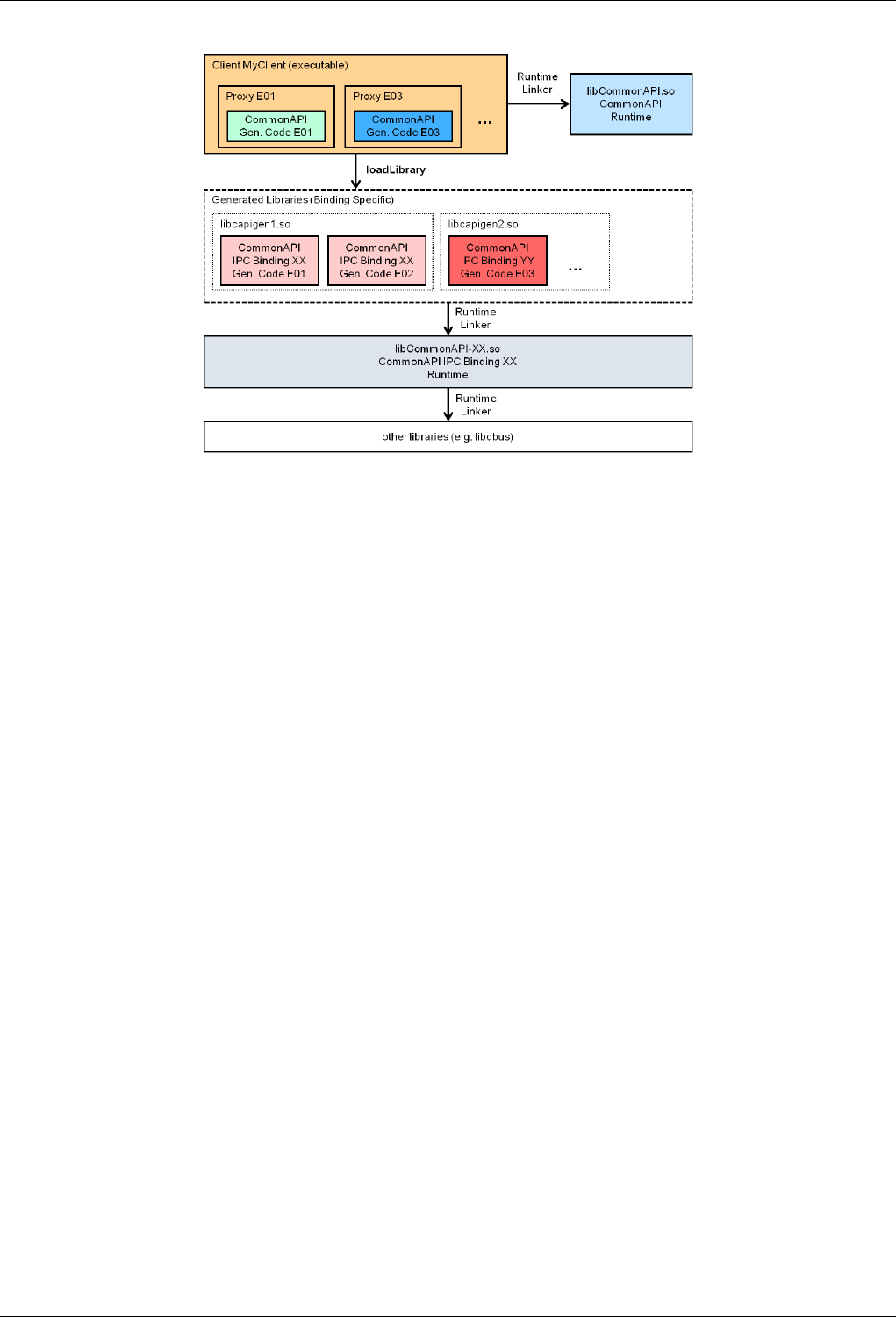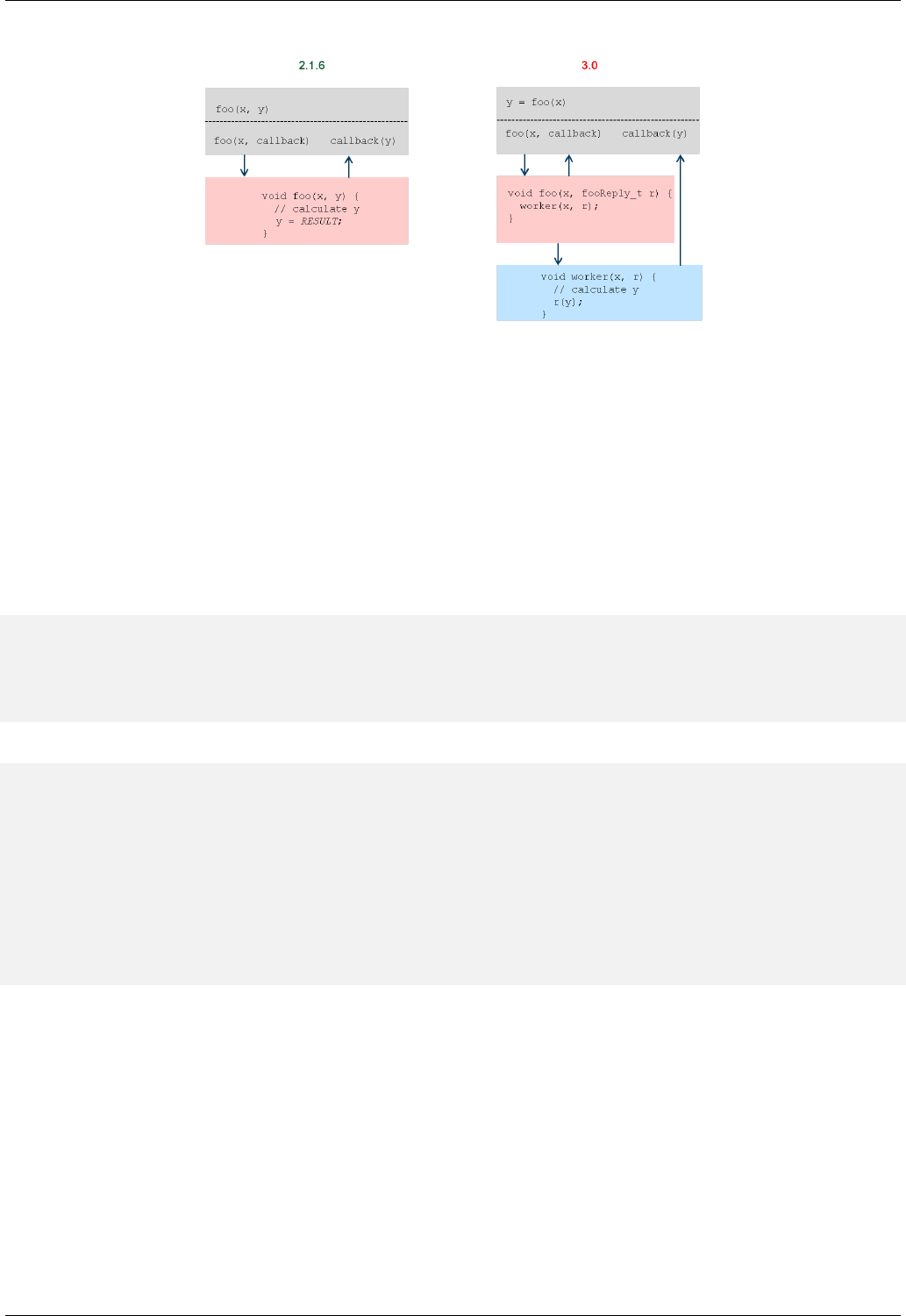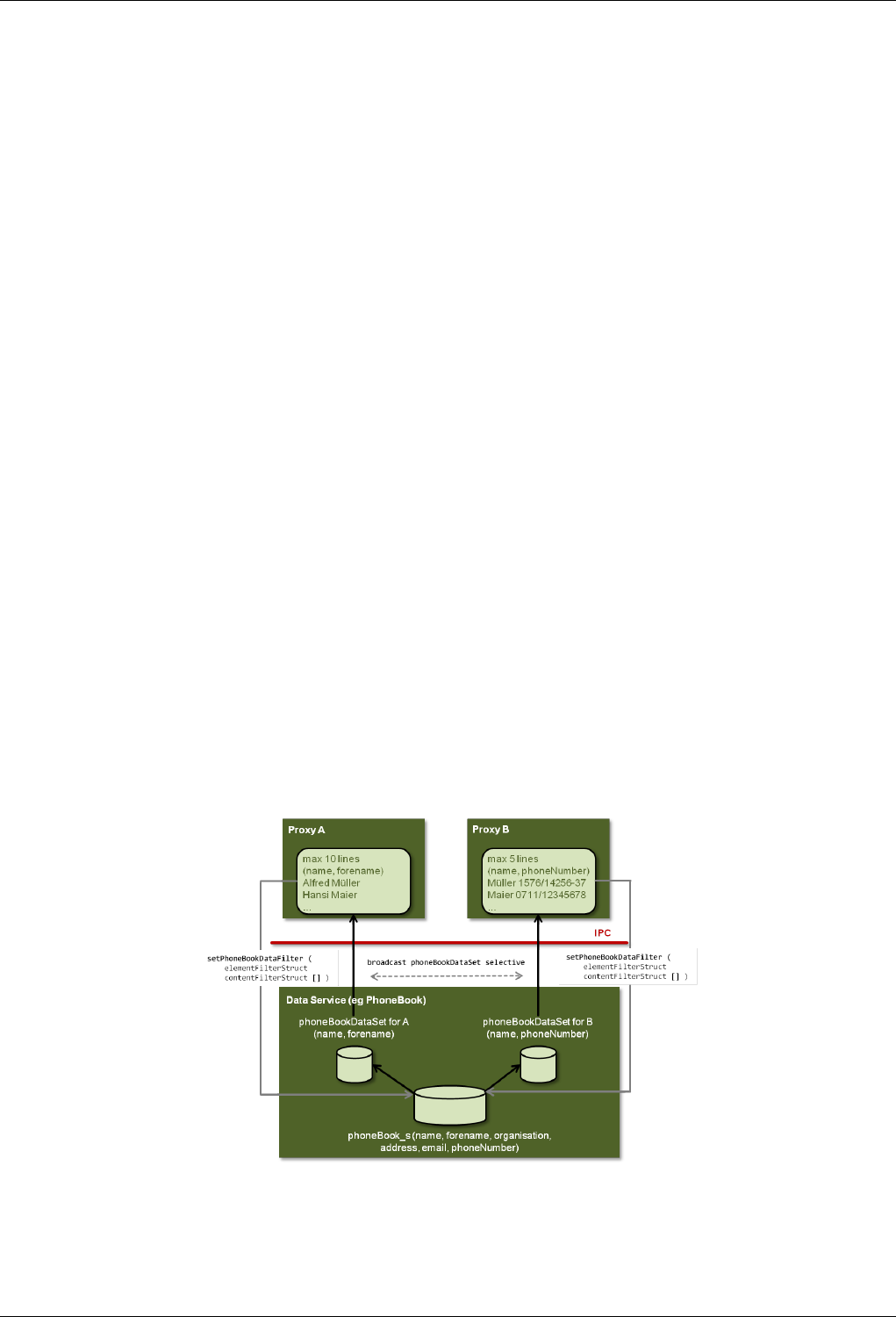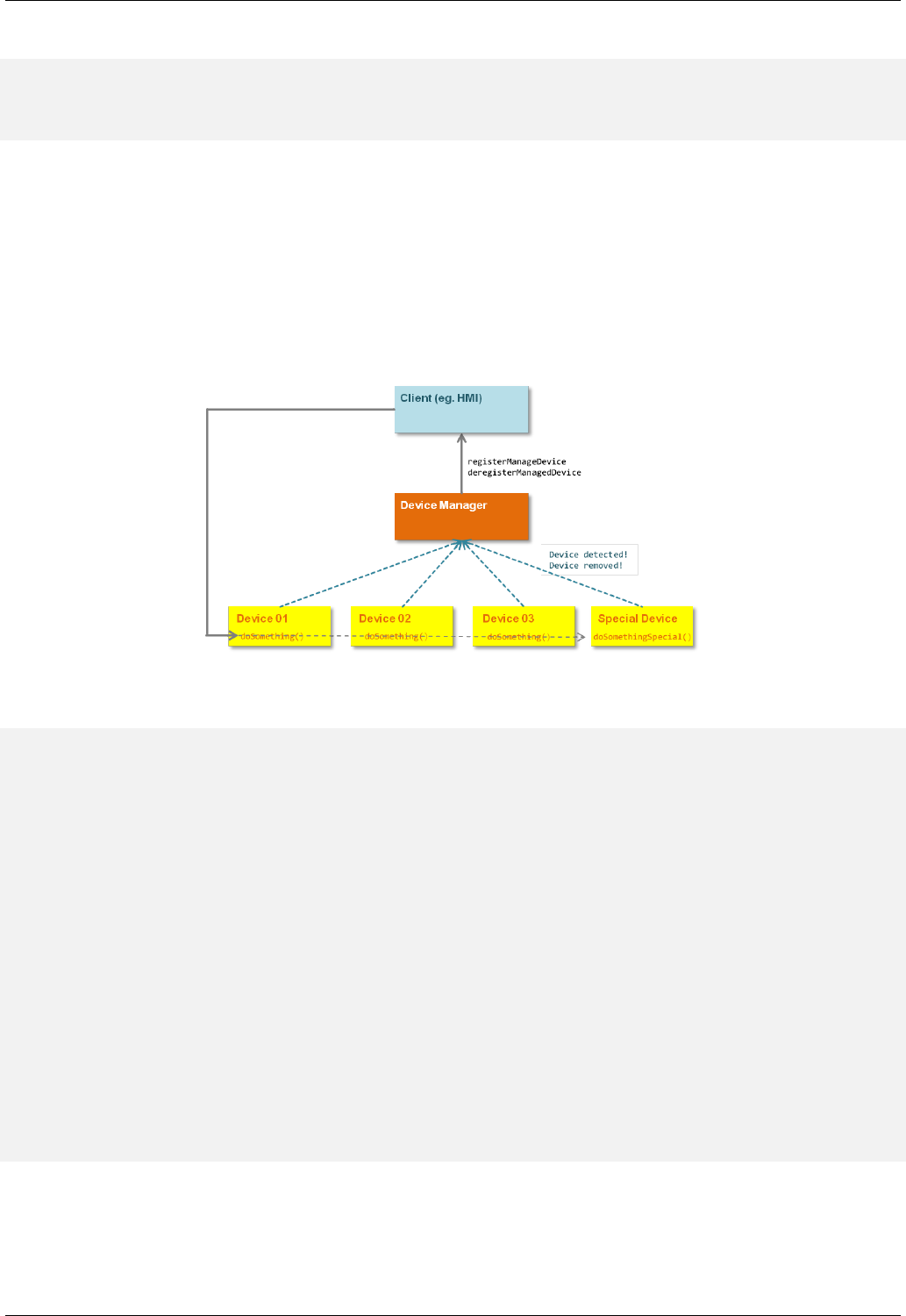CommonAPI C++ User Guide Common APICpp
User Manual:
Open the PDF directly: View PDF ![]() .
.
Page Count: 45

CommonAPI C++ User Guide i
CommonAPI C++ User Guide

CommonAPI C++ User Guide ii
Contents
1 Introduction 1
1.1 Aim of this document ................................................. 1
1.2 CommonAPI C++ ................................................... 1
1.3 Links ......................................................... 2
2 Integration Guide for CommonAPI users 3
2.1 Requirements ..................................................... 3
2.2 Dependencies ..................................................... 3
2.3 Compile Runtime ................................................... 3
2.3.1 Command-line ................................................ 3
2.3.2 Eclipse .................................................... 4
2.4 Compile tools ..................................................... 5
2.4.1 Command-line ................................................ 5
2.4.2 Eclipse .................................................... 5
2.5 Write Applications .................................................. 6
2.5.1 Generating Code ............................................... 6
2.5.2 Build Applications .............................................. 7
2.6 Project Setup ..................................................... 7
2.6.1 Structuring CommonAPI project libraries .................................. 7
2.6.2 Write CommonAPI Configuration Files ................................... 8
logging ................................................... 8
default ................................................... 9
proxy .................................................... 9
stub ..................................................... 9
2.6.3 CommonAPI Deployment .......................................... 10
2.6.4 CommonAPI Logging ............................................ 12
2.6.5 CMake .................................................... 12
Get a CMake variable with all generated files ................................ 12
Generate code within your CMake file .................................... 12
2.7 Windows ....................................................... 13
3 Basic Features 13
3.1 New CommonAPI 3 Features ............................................. 13
3.1.1 Franca And Deployment ........................................... 13
3.1.2 Build System CMake ............................................. 13
3.1.3 Changed Configuration Files ......................................... 13
3.1.4 CommonAPI Logging ............................................ 13

CommonAPI C++ User Guide iii
3.1.5 New Code Generator Command-line Parameters .............................. 13
3.1.6 Version In Namespace ............................................ 14
3.1.7 New Runtime Loading Concept ....................................... 14
3.1.8 Asynchronous Stubs ............................................. 14
3.1.9 CallInfo For Method Calls .......................................... 15
3.2 Creating Proxies And Stubs .............................................. 15
3.3 Namespaces ...................................................... 16
3.4 Multithreading and Mainloops ............................................ 18
4 Examples 18
4.1 Preliminary remarks .................................................. 18
4.2 Example 01: Hello World ............................................... 19
4.3 Example 02: Attributes ................................................ 21
4.4 Example 03: Methods ................................................. 25
4.5 Example 04: PhoneBook ............................................... 28
4.6 Example 05: Managed ................................................ 33
4.7 Example 06: Unions ................................................. 35
4.8 Example 07: Mainloop ................................................ 40
5 Contributor’s Guide 40
5.1 Preliminary Remarks ................................................. 40
5.2 Build Tests and Documentation ............................................ 40
5.3 Formatting Code ................................................... 41
5.4 Contribution of Code ................................................. 41

CommonAPI C++ User Guide 1 / 42
1 Introduction
1.1 Aim of this document
This user guide has the following content:
• installation instructions for CommonAPI in general including the code generator (CommonAPI Tools)
• a step by step tutorial on how you can write your first Hello World program
• examples for a deeper insight into the usage of CommonAPI in conjunction with Franca IDL
• additional information to CommonAPI which is not part of the CommonAPI specification
1.2 CommonAPI C++
CommonAPI C++ is a standardized C++ API specification for the development of distributed applications which communicate
via a middleware for interprocess communication. The main intention is to make the C++ interface for applications independent
from the underlying IPC stack. The basic principle can be seen in the following picture.
Figure 1: CommonAPI C++ Overview 1
• CommonAPI C++ is divided up in a middleware-independent part (CommonAPI Core) and in a middleware-specific part
(CommonAPI Binding).
• CommonAPI uses the interface description language FrancaIDL for the specification of interfaces (logical interface specifica-
tion). Code generation from FrancaIDL is an integrated part of CommonAPI.
• The code generator for CommonAPI C++ bindings needs middleware-specific parameters (deployment parameters). These
parameters are defined in Franca deployment files (*.fdepl).
Note
CommonAPI C++ Core has no obligatory deployment parameters. But it turned out that it makes sense to add also additional
deployment parameter to CommonAPI C++ Core itself.
The user API of CommonAPI is divided up into two parts (see picture below):
• A FrancaIDL based, generated part which contains API functions that are related to the types, attributes and methods of the
FrancaIDL files.
• A "common" part (Runtime API) which contains API functions for loading the runtime environment, creating proxies and so
on.

CommonAPI C++ User Guide 2 / 42
Figure 2: CommonAPI C++ Overview 2
This picture shows in more detail how the elements of CommonAPI C++ fit together. Note that:
• the vast majority of the user API is the generated part of CommonAPI.
• there is no direct relation between CommonAPI Core and the IPC stack.
• the generated code of the CommonAPI Binding has interfaces to all other parts of CommonAPI.
The workflow for developers of applications is as follows:
• Create a FrancaIDL file with the specification of an interface with methods and attributes.
• Generate code for client and service by starting the CommonAPI code generator.
• Implement the service by implementing the methods in the generated skeleton.
• Implement the client by creating proxies and calling these methods by using the proxy.
1.3 Links
CommonAPI is a GENIVI project. Source code and latest news can be found at http://projects.genivi.org/commonapi/. Source
code can be found in the Git repository (http://git.projects.genivi.org/). For documentation please visit the GENIVI document
page http://docs.projects.genivi.org/.
Note
At http://git.projects.genivi.org/ you will find only source code even for the code generator. It might be cumbersome to build the
code generator of your own; for your convenience you will find executables and update-sites at http://docs.projects.genivi.org/-
yamaica-update-site/.
Closely related to CommonAPI is the yamaica project which provides a full integration of all Franca IDL and CommonAPI
plugins and some more enhanced features like the import and export of Franca files to Enterprise Architect. The yamaica project
provides eclipse update-sites for CommonAPI and yamaica (see http://docs.projects.genivi.org/yamaica-update-site/) ready for
installation.
The official FrancaIDL site is at the moment: https://code.google.com/a/eclipselabs.org/p/franca/

CommonAPI C++ User Guide 3 / 42
2 Integration Guide for CommonAPI users
The following descriptions assume that host and target platform are Linux platforms. However CommonAPI supports also
Windows as host and target platform. All you need to know for Windows concerning CommonAPI you find in the separate
Windows paragraph below at the end of this Integration Guide.
2.1 Requirements
CommonAPI was developed for GENIVI and will run on most Linux platforms. Additionally it is possible to run it under
Windows for test and development purposes. Please note:
• CommonAPI uses a lot of C++11 features, as variadic templates, std::bind, std::function and so on. Make sure that the compiler
of your target platform is able to compile it (e.g. gcc 4.8).
• The build system of CommonAPI is CMake; please make sure that it is installed on your host. CommonAPI requires a CMake
version > 2.8.12.
• This user guide describes only the "common" CommonAPI part; there are no binding specific explanations. Please refer to the
binding specific user guide for further information.
• Do not use earlier versions of Eclipse as Luna; it could work but there is no warranty.
• The build tool chain for the code generators is Maven; make sure that at least Maven 3 is available. If you use eclipse make
sure that the maven plug-in is installed.
2.2 Dependencies
Figure 3: CommonAPI-Dependencies
2.3 Compile Runtime
2.3.1 Command-line
For building CommonAPI from the command-line download the Common API runtime via Git from the GENIVI Git repository,
switch to the desired tag (e.g. 3.0.0) and compile it using CMake:
$ git clone git://git.projects.genivi.org/ipc/common-api-runtime.git
$ cd common-api-runtime
$ git checkout tags/3.0.0
$ mkdir build
$ cd build
$ cmake ..
$ make
This is the standard procedure and will hopefully create the shared CommonAPI runtime library libCommonAPI.so in build/s-
rc/CommonAPI. Note that CMake checks if doxygen and asciidoc are installed. These tools are only necessary if you want
to generate the documentation of your own. The unit tests of CommonAPI are implemented by using the Google C++ Testing
Framework. If you want to build and run the unit tests the environment variable GTEST_ROOT must point to the correct directory
(see the contributor’s guide below).

CommonAPI C++ User Guide 4 / 42
Note
If you prefer to install CommonAPI from a tar file you can get the actual tar file from: http://docs.projects.genivi.org/yamaica-
update-site/CommonAPI/runtime/
There are several options for calling CMake and make targets.
Generate makefile for building a static CommonAPI library (default is a shared library). The library will be in /build/src/Com-
monAPI.
$ cmake -DBUILD_SHARED_LIBS=OFF ..
Generate makefile for building the release version of CommonAPI (default is debug).
$ cmake -DCMAKE_BUILD_TYPE=Release ..
Without any further settings make install will copy CommonAPI libraries and header files to /usr/local. You can change
this destination directory by changing the installation prefix (e.g. to test).
$ cmake -DCMAKE_INSTALL_PREFIX=/test ..
Additional cmake parameters:
-DUSE_INSTALLED_COMMONAPI OFF, ON use uninstalled / installed
CommonAPI core library
-DMAX_LOG_LEVEL ERROR, WARNING, INFO,
DEBUG, VERBOSE
log messages with lower log
level are ignored
Make targets:
make all Same as make. Will compile and link CommonAPI.
make clean Deletes binaries, but not the files which has been generated by CMake.
make maintainer-
clean
Deletes everything in the build directory.
make install Copies libraries to /user/local/lib/commonapiX.X.X and header files to
/user/local/include/commonapiX.X.X/CommonAPI.
make DESTDIR=<
install_dir >
install
The destination directory for the installation can be influenced by
DESTDIR.
Further make targets will be described in the contributor’s guide below.
2.3.2 Eclipse
Start with importing your project by File→New→Makefile Project with Existing Code. Select your project directory and Linux
GCC.
If not yet available, create a Make Target (e.g. with the name Run cmake) and edit it. Set the "Build command:" to:
cmake -E chdir build/ cmake -G "Unix Makefiles" ../
and delete the "Make target:" field and let it empty.

CommonAPI C++ User Guide 5 / 42
Figure 4: CommonAPI C++ Eclipse Settings 01
Create the build directory directly in your project directory.
Then you can start Build target in the context menu of your Make target and then build the project by Project→Build
Project.
2.4 Compile tools
An executable version of the command-line version of the CommonAPI code generator is available for Linux (32 bit) as zip-file.
An update-site for installing the code generators in eclipse is also available (see below). The following instructions are for the
case that you have to build the code generator yourself.
2.4.1 Command-line
You can build all code generators by calling maven from the command-line. Open a console and change in the directory
org.genivi.commonapi.core.releng of your CommonAPI-Tools directory. Then call:
mvn -Dtarget.id=org.genivi.commonapi.core.target clean verify
After the successful build you will find the commond-line generators archived in org.genivi.commonapi.core.cli.product/target/products/commonapi-
generator.zip and the update-sites in org.genivi.commonapi.core.updatesite/target.
2.4.2 Eclipse
Make sure that you have installed the m2e - Maven Integration for Eclipse plug-in. Then create a Run Configuration in Eclipse.
Open the Run configuration settings. On the left side of you should find a launch configuration category Maven Build. Create
a new launch configuration and add the parameter target.id with the value org.genivi.commonapi.core.target.
Set the Goals to clean verify.

CommonAPI C++ User Guide 6 / 42
Figure 5: CommonAPI C++ Eclipse Build Tools Settings
2.5 Write Applications
CommonAPI requires a basic workflow for creating executable applications.
Figure 6: CommonAPI C++ Workflow
2.5.1 Generating Code
No matter which development environment is used, the API for the applications is created by the CommonAPI code generator
which is available as command-line version and as Eclipse update-site.
The simplest way to use the CommonAPI Tools is to add the update-site available on the GENIVI project servers to your Eclipse.
Add the update site in Eclipse by calling Help→Install New Software→Add. Enter the URL: http://docs.projects.genivi.org/-
yamaica-update-site/CommonAPI/updatesite/ and confirm.
Then select the newly added site in the site selection dropdown box, and in the Software selection window, select the entire
"GENIVI Common API" Tree.
After the software has been installed in Eclipse you can right-click on any .fidl or .fdepl file and generate C++ code for
CommonAPI by selecting the CommonAPI→Generate Common API Code option.
If you have built the update-site of your own, you can add the site as well; just add it as archive.

CommonAPI C++ User Guide 7 / 42
An executable version of the command-line version of the CommonAPI code generator is available only for Linux (32 bit) as
zip-file at http://docs.projects.genivi.org/yamaica-update-site/CommonAPI/generator. Download the zip-file and unzip it to an
appropriate directory. Then it is ready for use.
Call the executable commonapi_generator as follows:
commonapi_generator [options] file [file...]
Valid Options are:
-dest < path/to/output/folder > The generated files will be saved at this
Location.
-pref < path/to/header/file > Here you can set the text which will be placed
as a comment on each generated file (for
example your license).
Note
If your CommonAPI binding requires deployment files the input for the code generator is the appropriate deployment file which
imports the Franca file. For some bindings (e.g. D-Bus) and deployment file is not obligatory; in this case it is also possible to
start the code generator with fidl-files as input.
2.5.2 Build Applications
Your application should compile and link only with the generated CommonAPI code and the CommonAPI runtime library. For
a fast setup please consider the provided examples in CommonAPI-Tools/CommonAPI-Examples.
2.6 Project Setup
2.6.1 Structuring CommonAPI project libraries
CommonAPI executables typically consist of 6 parts:
1. The application code itself which is written manually by the developer.
2. The generated CommonAPI (binding independent) code. In clients this code contains proxy functions which are called
by the application; in services it contains generated functions which must be manually implemented by the developer
(optionally it is possible to generate default implementations).
3. The CommonAPI runtime library.
4. The generated, binding specific code (so-called glue code).
5. The runtime library of the binding.
6. Generic libraries of the used middleware (e.g. libdbus).
Even if there are several possibilities to divide these 6 parts up into shared or static libraries and to integrate them on a target
platform, there is a standard way which is intended for the integration of CommonAPI applications (see picture below).

CommonAPI C++ User Guide 8 / 42
Figure 7: CommonAPI C++ Structuring Libraries
The standard way assumes that there is a platform software which provides necessary standard libraries in a suitable version.
For CommonAPI these are the runtime libraries of CommonAPI itself, bindings and the associated middleware. Furthermore
the platform should provide binding specific libraries which contain generated binding specific code (glue code). The glue code
can be divided up into several shared libraries depending on used bindings, number of interfaces and other platform and project
specific requirements. The application can now be delivered together with the generated binding independent code which can be
statically or dynamically linked.
The glue code library will now be loaded at the exact moment in which a proxy is created. The right library will be found by the
evaluation of the CommonAPI configuration file that contains the association between CommonAPI address and the glue code
library. In the case that there are no entries in the configuration file, default settings are used.
The glue code library is binding specific; that means that the required runtime libraries are loaded automatically by the runtime
linker. In the case that a certain instantiated interface in a service is offered via another middleware as before, it is sufficient just
to change the entries in the configuration file, provided that a generated glue code library is available.
2.6.2 Write CommonAPI Configuration Files
CommonAPI and available bindings can be configured by ini-files (see e.g. http://en.wikipedia.org/wiki/INI_file).
The CommonAPI configuration file is commonapi.ini. There are three places where CommonAPI Runtime tries to find this
file (in the following order):
1. in the directory of the current executable. If there is a commonapi.ini file, it has the highest priority.
2. in the directory which is specified by the environment variable COMMONAPI_CONFIG.
3. in the global default directory /etc.
The configuration file has 4 possible sections; all sections are optional.
logging
CommonAPI has an internal logging mechanism which can be parameterized by the settings of this section:
•console=true/false

CommonAPI C++ User Guide 9 / 42
•file= <file name>
•dlt=true/false
•level=fatal/error/warning/info/debug/verbose
Example:
[logging]
console=true
file=./mylog.log
dlt=true
level=verbose
Note
If the configured log level is higher than the maximum log level that was defined at compile time, the maximum log level will be
used.
default
Section for setting the default value for the used binding.
•binding=dbus/someip
Example:
[default]
binding=dbus
proxy
This section defines for each required CommonAPI address the shared library with the binding specific, generated glue code
which has to be loaded when the proxy is created.
•<CommonAPI address>=<library name>
If no library is defined, CommonAPI uses default settings for library names and paths; for further information see chapter
Creating Proxies And Stubs.
Example:
[proxy]
local:commonapi.examples.Test:commonapi.examples.Test=libTest-DBus.so
stub
Analogous to the proxy section.
Example:
[stub]
local:commonapi.examples.Test:commonapi.examples.Test=libTest-DBus.so

CommonAPI C++ User Guide 10 / 42
2.6.3 CommonAPI Deployment
The CommonAPI code generator supports nearly the full feature set of Franca IDL and works without any deployment file.
However it is possible to write deployment files for interface specifications not only for bindings but also for CommonAPI itself
based on the following deployment specification.
specification org.genivi.commonapi.core.deployment {
for interfaces {
/*
*define the enumeration backing type on CommonAPI C++ level for whole interface.
*/
DefaultEnumBackingType : {UInt8, UInt16, UInt32, UInt64, Int8, Int16, Int32, Int64} ←-
(default: UInt32);
}
for providers {
/*
*Enumerate all service instances this provider depends on (if any).
*/
ClientInstanceReferences : Instance[] (optional);
}
for instances {
/*
*The CommonAPI address string has the format "domain:interfaceid:instanceid"
*according to CommonAPI specification.
*To avoid inconsistencies only domain and instance id can be specified during ←-
deployment,
*while the interface id is fixed by the interface the instance realizes.
*/
Domain : String (default:"local"); // the domain part of the CommonAPI address ←-
.
InstanceId : String; // the instance id of the CommonAPI ←-
address.
/*
*Define default timeout for all methods awaiting results of an instance in ←-
seconds.
*0s means no timeout/waiting forever.
*if the timeout elapsed without arrival of a valid result an error will be ←-
delivered to the application.
*/
DefaultMethodTimeout : Integer (default:0);
/*
*provide properties to register for instance. use "Name=Value" as format.
*This deployment property is currently not supported.
*/
PreregisteredProperties : String [] (optional);
}
for methods {
/*
*timeout for method calls in ns.
*If timeout is defined with value > 0, then a method call will return with a ←-
timeout error
*in case no result arrived before the timeout elapsed.
*0 means no timeout.
*/
Timeout : Integer (default: 0);
}

CommonAPI C++ User Guide 11 / 42
for enumerations {
/*
*define the enumeration backing type on CommonAPI C++ level for a specific ←-
enumeration.
*If not specified use "ApiDefaultEnumBackingType".
*/
EnumBackingType : {UInt8, UInt16, UInt32, UInt64, Int8, Int16, Int32, Int64} ( ←-
optional);
}
}
The enumeration backing type can be set on CommonAPI C++ level not only specific for single enumerations but also generally
for the whole interface. Please note that bindings might also have deployment settings which concern the backing type of
enumerations.
It is also possible to define timeouts for function calls. Another possibility to set this timeout is to define it in the optional
CallInfo parameter of the method call.
The settings for instances and providers are not evaluated by the code generator.
See the following example for the usage of the deployment parameters. The Franca specification is:
package commonapi.examples
interface Example {
version { major 0 minor 1 }
method test {
in {
EN x
}
}
enumeration EN {
DEFAULT
NEW
}
}
Possible deployment settings could look like:
import "CommonAPI_deployment_spec.fdepl"
import "Example.fidl"
define org.genivi.commonapi.core.deployment for interface commonapi.examples.Example {
DefaultEnumBackingType = UInt8
method test {
Timeout = 1
}
enumeration EN {
EnumBackingType = UInt64
}
}

CommonAPI C++ User Guide 12 / 42
2.6.4 CommonAPI Logging
CommonAPI Runtime informs about internal errors, warnings and other events by means of the CommonAPI Logger. Please
refer to the chapter Write CommonAPI Configuration Files if you want to know in general how it is possible to get CommonAPI
log messages.
CommonAPI supports the DLT standard. To get DLT log messages make sure that DLT is installed when running CMake. If
CMake finds the DLT library the compiler switch -DUSE_DLT is set. Additionally set the key dlt=true in the logging section
of your configuration file.
The DLT application ID is always set to CAPI; the context ID can be set by the application (see e.g. example 01):
CommonAPI::Runtime::setProperty("LogContext","E01C");
The default value for the LogContext is CAPI.
2.6.5 CMake
Since version 3 the build system of CommonAPI has been converted from Autotools to CMake (http://www.cmake.org/). A
good starting point for writing CMake files for your application are the CMake files which are delivered with the CommonAPI
examples in the CommonAPI Tools project.
Here are some additional hints how specific problems related to Franca IDL and CMake can be solved.
Get a CMake variable with all generated files
Let’s assume that the code generator has generated all source fules into thedirectory src-gen. The CMake command:
FILE(GLOB GEN_SRCS src-gen/*cpp)
creates the CMake variable GEN_SRC which can be used e.g. like
add_executable(${GEN_SRCS} _<other sources>_)
for building the execuatble.
Generate code within your CMake file
As described before one step in building your application is the generation of source files from your Franca interface specification.
If you do not want to start the code generator manually you have several possibilities to automate that step. The following extract
of a CMake file shows how it could be done within a CMake file.
We assume that your fidl files are located in the subdirecory fidl of your project directory and the generated output in src-gen.
set(FIDL_DIR ${PRJ_SRC_DIR}/fidl)
set(GEN_SRC_DIR ${PRJ_SRC_DIR}/src-gen)
set(GEN_COMMAND _<path-to-generator>_/commonapi_generator -dest ${GEN_SRC_DIR} ${FIDL_DIR}/ ←-
MyFidl.fidl)
add_custom_command(OUTPUT ${SRC_GEN_DIR}/_<generated-source-files>_.cpp
COMMAND ${GEN_COMMAND}
DEPENDS ${FIDL_DIR}/MyFidl.fidl
WORKING_DIRECTORY ${PRJ_SRC_DIR}
COMMENT "Call CommonAPI code generator."
)
Set the OUTPUT in the custom command to all generated src files.
Note
For CommonAPI itself it might be possible that there are no cpp files in the output. This is the case if you don’t generate the
skeletons for the stub and you don’t have any complex datatypes in yor fidl file.

CommonAPI C++ User Guide 13 / 42
2.7 Windows
CommonAPI can also run on Windows platforms. In order to get a running system please refer to the binding specific user
guides. To compile CommonAPI for Windows, do the following steps:
• Open the file CommonAPI.sln with Visual Studio 2013 (at least Update 4).
• Build the project CommonAPI.
3 Basic Features
3.1 New CommonAPI 3 Features
The new CommonAPI version 3 contains a number of bug fixes, some internal modifications and new features. For the user of
CommonAPI there are not as many changes as it may seem at first glance. The following sections provide an overview of the
most important changes.
3.1.1 Franca And Deployment
CommonAPI 3 supports Franca IDL 0.9.1 and additionally some new deployment parameters (see chapter CommonAPI Deploy-
ment).
3.1.2 Build System CMake
The build system of CommonAPI has been converted from Autotools to CMake. Please refer to the build instructions of this user
guide. For an improved window support also Windows project files are delivered.
3.1.3 Changed Configuration Files
The configuration files have now the ini file format and some additional settings. Please refer to the chapter Write CommonAPI
Configuration Files.
3.1.4 CommonAPI Logging
CommonAPI 3 provides logging messages, e.g. in DLT format. Refer to chapter CommonAPI Logging.
3.1.5 New Code Generator Command-line Parameters
The parameters of the code generator are now significantly extended. The usage of the code generator is now (Linux 32 bit):
commonapi-generator-linux-x86 <options> <fidl files>
Options Description
-h, --help display help of available console commands
-p,--plugins print plug-in versions
-v,--version print code generator version
-d,--dest <arg> The default output directory
-dc,--dest-common <arg> The directory for the common code
-dp,--dest-proxy <arg> The directory for proxy code
-ds,--dest-stub <arg> The directory for stub code
-dsk,--dest-skel <arg> The directory for the skeleton code

CommonAPI C++ User Guide 14 / 42
Options Description
-l,--license <arg> The file path to the license text that will be added to each
generated file
-ll,--loglevel <arg> The log level (quiet or verbose)
-nc,--no-common Switch off generation of common code
-ng,--no-gen Switch off code generation completely
-np,--no-proxy Switch off generation of proxy code
-ns,--no-stub Switch off generation of stub code
-nsc,--no-sync-calls Switch off code generation of synchronous methods
-nv,--no-val Switch off validation of the fidl file
-pf,--printfiles Print out generated files
-pre,--prefix-enum-literal <arg> The prefix added to all generated enumeration literals
-sk,--skel <arg> Generate skeleton code. The optional argument specifies the
postfix. Without argument, the postfix is default
-sp,--searchpath <arg> The search path to contain fidl/fdepl files
-wod,--without-dependencies Switch off code generation of dependencies
Please note:
• It is now possible to define different destination directories for proxy, stub and common code and to switch off the generation
of proxy, stub or common code.
• The CommonAPI 2.x code generator always generated default implementations for the stubs (skeleton). This is not the default
behavior anymore. Call the code generator with the option -sk without an argument to get the same result as before.
• It is possible to influence the literals of enumerations by setting the option -pre. With this option you can add a custom prefix
to all generated enumeration literals.
3.1.6 Version In Namespace
Since CommonAPI version 3, the version of the Franca interface becomes part of the C++ namespace. The version is added at
the beginning of the namespace path, e.g. for an interface with version 1.0 the modified namespace begins with v1. Please refer
to chapter Namespaces for further information.
3.1.7 New Runtime Loading Concept
With CommonAPI 2.x you had to follow three steps to create proxies (or stubs):
• Get a runtime object for your required middleware.
• Create a factory from this runtime object (optionally with a mainloop context).
• Build your proxy using this factory; one argument is the CommonAPI address.
This procedure has been simplified and improved for the dynamic loading of CommonAPI bindings. For the relevant details see
chapter Creating Proxies And Stubs.
3.1.8 Asynchronous Stubs
For client implementations CommonAPI offers the possibility to call functions (Franca methods or setter/getter functions for
attributes) synchronously or asynchronously. In the asynchronous case the reply for the call will come as callback-function call.
On stub side CommonAPI required to calculate the return values immediatly (see picture).

CommonAPI C++ User Guide 15 / 42
Figure 8: Asynchronous Stubs
But some applications work as kind of intermediate layer and simply pass on function calls to a next application. In this case it
was only under relatively high cost possible to pass the function calls to another application and to delegate the calculation of
the return values. This is now possible because the return values are now wrapped into a function object which can be passed to
another execution path.
3.1.9 CallInfo For Method Calls
Method calls now have an additional, optional parameter which is called CallInfo. See e.g. the generated call sayHello on
proxy side:
virtual void sayHello(
const std::string &_name, CommonAPI::CallStatus &_status,
std::string &_message,
const CommonAPI::CallInfo *_info = nullptr
);
CallInfo is defined as:
struct COMMONAPI_EXPORT CallInfo {
CallInfo()
: timeout_(DEFAULT_SEND_TIMEOUT_MS), sender_(0) {
}
CallInfo(Timeout_t _timeout)
: timeout_(_timeout), sender_(0) {
}
Timeout_t timeout_;
Sender_t sender_;
};
The timeout_ defines how long the client will wait for the response from the service before it returns with CallStatus REMOT
E_ERROR.
The attribute sender_ can be used for passing an application specific sender handle to the method call which can be used in
bindings to log the correlation between the sender handle and middleware specific information like serial numbers.
3.2 Creating Proxies And Stubs
The CommonAPI runtime creates proxies/registers stubs at the binding which is either configured for the given proxy/stub
instance or is the default binding if no configured binding could be found. The configuration of a binding for a specific instance
is done by providing an address mapping for the instance. An address mapping can either be specified using a deployment file to
generate the interface specific binding code or by an entry in the binding configuration file. Such entries look like:

CommonAPI C++ User Guide 16 / 42
[_<commonapi address>_]
_<ipc specific address parameter>_ = ...
_<ipc specific address parameter>_ = ...
...
Note
CommonAPI does not check for multiple definitions for the same CommonAPI address. In this case, the binding that was
registered first, will be used to create the proxy/register the stub.
The default default binding is "dbus". This can be changed by setting the "binding" variable in the "default"-section of the Com-
monAPI configuration file or by setting the environment variable "COMMONAPI_DEFAULT_BINDING". The environment
variable overwrites the setting provided by the configuration file.
Note
A binding that is used as default binding should be able to automatically (without further configuration) translate CommonAPI
addresses to the addresses used by the communication mechanism it binds to. Otherwise all used instances must be defined
in the deployment.
Bindings are implicitly registered by the binding specific generated code for an interface. This code can either be statically linked
or dynamically loaded at runtime. In the first case, the bindings an application uses are statically bound to the application while
in the second case the application and their used bindings are independent from each other. The name of a library that needs to
be loaded before being able to create a proxy or register a stub for a specific interface instance is determined as follows:
1. It is checked whether the requested action can be done be an already registered factory.
2. If 1. fails, the name of the library that contains the needed code is determined:
a. If the requested proxy/stub instance is configured, the configured name will be used. Such configurations are done
in the "proxy" and "stub" sections of the CommonAPI configuration file and look like: <commonapi address> =
<library name>
b. If no configuration exists it is checked whether the property "LibraryBase" is set. If yes, the name is set to lib<LibraryBase>.
c. If neither a configuration exists nor the property "LibraryBase" is set, the name will be built from the CommonAPI
address as lib<domain>_<interface>_<instance>.
3. The runtime tries to load the library with the determined name. If it succeeds, it tries to create the proxy/register the stub
again.
3.3 Namespaces
See the example E01HelloWorld:
package commonapi.examples
interface E01HelloWorld {
version { major 0 minor 1 }
// Interface definition here
}
The generated code looks as follows:

CommonAPI C++ User Guide 17 / 42
namespace v0 {
namespace commonapi {
namespace examples {
class E01HelloWorld {
public:
virtual ~E01HelloWorld() { }
static inline const char*getInterface();
static inline CommonAPI::Version getInterfaceVersion();
};
const char*E01HelloWorld::getInterface() {
return ("commonapi.examples.E01HelloWorld");
}
CommonAPI::Version E01HelloWorld::getInterfaceVersion() {
return CommonAPI::Version(0, 1);
}
}// namespace examples
}// namespace commonapi
}// namespace v0
The generated code will be generated into the directory src-gen/v0/commonapi/examples.
The main reason for adding the version at the beginning of the namespace is that we consider the name of the interfaces together
with the package path (fully qualified name) as a unit, as it is specified in the Franca file. This name should not be destroyed by
an intervening add on.
It is however possible to create project specific namespaces if needed, as the following example shows:
#include <iostream>
namespace v1_0 {
namespace commonapi {
namespace examples {
class MySample {
public:
void print() const { std::cout << "commonapi.examples.v1_0.MySample" << std::endl; }
};
}// namespace examples
}// namespace commonapi
}// namespace v1_0
namespace v1_1 {
namespace commonapi {
namespace examples {
class MySample {
public:
void print() const { std::cout << "commonapi.examples.v1_1.MySample" << std::endl; ←-
}
};
}// namespace examples
}// namespace commonapi
}// namespace v1_1

CommonAPI C++ User Guide 18 / 42
namespace commonapi {
namespace examples {
namespace V1_0 = v1_0::commonapi::examples;
namespace V1_1 = v1_1::commonapi::examples;
}// namespace examples
}// namespace commonapi
using namespace commonapi::examples;
int
main(int argc, char **argv) {
V1_0::MySample aSample;
V1_1::MySample bSample;
aSample.print();
bSample.print();
return 0;
}
3.4 Multithreading and Mainloops
Please refer to example 07 for an example of the CommonAPI mainloop integration with the glib mainloop.
4 Examples
4.1 Preliminary remarks
The examples describe how some standard problems of interface design and implementation can be solved with Franca IDL and
CommonAPI. Before you start make sure that your environment is properly installed as described in the integration guide. Please
do not consider only the integration guide in this document but also in the binding specific tutorial.
The examples provide a more or less generic CMake file for building the executables. Two executables are needed: a service and
a client program. The standard procedure to build one of these example programs is:
$ cd build
$ cmake -DUSE_INSTALLED_COMMONAPI=ON/OFF ..
$ make
Set USE_INSTALLED_COMMONAPI to ON if you use an installed version of CommonAPI; set it to OFF if you use the working
copy.
In case you are using the D-Bus binding and you have not installed the patched D-Bus library (libdbus) it might be necessary to
set a D-Bus specific option:
cmake -DUSE_INSTALLED_COMMONAPI=OFF -DUSE_INSTALLED_DBUS=OFF ..
Please read also the chapters in the user guide about the configuration files. One possibility to specify the path to the CommonAPI
configuration file is to set the environment variable:
export COMMONAPI_CONFIG=<path to CommonAPI-Examples>/E01HelloWorld/commonapi4dbus.ini
If do not specify any configuration file it is assumed that you want to use the D-Bus binding. Other environment variables you
might need are:

CommonAPI C++ User Guide 19 / 42
•LD_LIBRARY_PATH should contain the path to the libdbus if you use the D-Bus binding with an uninstalled libdbus and
should contain the path to your gluecode libraries, e.g. LD_LIBRARY_PATH=<path to libdbus>/dbus-1.8.20/
dbus/.libs:<path to CommonAPI-Tools>/CommonAPI-Examples/E01HelloWorld/build
•VSOMEIP_CONFIGURATION should contain the path to your vsomeip configuration file if you are using the SOME/IP
binding, e.g. VSOMEIP_CONFIGURATION=<path to CommonAPI-Tools>/CommonAPI-Examples/E01Hello
World/vsomeip-local.json
Here are some hints if you want to configure your eclipse project for the CMake build:
• Install the CMakeEd plug-in which provides an editor for CMake files (http://cmakeed.sourceforge.net/eclipse/).
• Create a build directory (e.g. /build) directly in the project directory.
• Select the projects properties, then C/C++ build and set the Build Command to your make call:
make -C ${ProjDirPath}/build VERBOSE=1
The build directory must be empty. Create a make target (e.g. via Window→Show View→Make Target). Set the build command
to:
cmake -E chdir build/ cmake <options> ..
The above described environment variables you could specify in the Run Configuration of your executable files (cleint and
service).
4.2 Example 01: Hello World
This example contains step-by-step instructions how to create the code for the Hello World introductory example of Com-
monAPI C++. Even this is a CommonAPI tutorial with no references to any special bindings, we give here some hints concerning
existing bindings. For a deeper insight please refer to the binding specific tutorials. We assume that you use the Eclipse tool
chain and that everything is properly installed as described in the Integration Guide of this tutorial.
The first step in developing a CommonAPI application likely will be the definition of the RMI interface the client will use to
communicate with the server. In the context of CommonAPI, the definition of this interface always happens via the Franca IDL,
regardless of which communication mechanism you intend to use in the end.
For this tutorial, create an arbitrarily named file ending in .fidl in your Eclipse project (in this case E01HelloWorld.fidl). It is not
relevant where in your project you have placed this file, as the code generated from this file will always be put in the automatically
created src-gen folder at the top level of the project hierarchy.
Open your newly created E01HelloWorld.fidl-file, and type the following lines:
package commonapi.examples
interface E01HelloWorld {
version { major 0 minor 1 }
method sayHello {
in {
String name
}
out {
String message
}
}
}

CommonAPI C++ User Guide 20 / 42
Now, save the .fidl file and right click it. As you have installed the CommonAPI code generator and further generators for the
bindings, you will see a menu item saying Common API, with sub menu items for generating the Common API level code only
(Generate C++ Code) and for generating the required glue code (e.g. for D-Bus you find Generate D-Bus C++ Code).
Now start the code generators. You will find the generated code in the sub-directory src-gen.
All files that have a the name of your binding (e.g. DBus) in their name are glue code required by the binding and are not relevant
while developing your application, they only need to be compiled with your application.
All other files that have a Proxy in their name are relevant for you if you develop a client, all other files that have a Stub in their
name are relevant for you if you develop a service. A proxy is a class that provides method calls that will result in remote method
invocations on the service, plus registration methods for events that can be broadcasted by the service.
A stub is the part of the service that will be called when a remote method invocation from a client arrives. It also contains
methods to fire events (broadcasts) to several or all clients. The stub comes in two flavors: one default stub that contains empty
implementations of all methods, thereby allowing you to implement only the ones you are interested in, and a Stub skeleton
where you have to implement everything yourself before you can use it. A service will have to implement a subclass of either of
the two in order to make itself available to the outside world (or just use the default stub if your service should not be able to do
anything except firing events).
In this tutorial, we will create both a client and a service in order to be able to see some communication going on.
Start by implementing the client by creating a new .cpp source file in your project (e.g. e01HelloWorldClient.cpp). Make sure
you have a main method in order to start the client application.
Here, you will need two includes in order to access the Common API client functionality:
#include <iostream>
#include <string>
#include <unistd.h>
#include <CommonAPI/CommonAPI.hpp>
#include <v0/commonapi/examples/E01HelloWorldProxy.hpp>
Please note that you always have to include CommonAPI.hpp for accessing the runtime part of CommonAPI and the generated
proxy. If your defined interface has a version number then you will find the version in the namespace of your interface class and
in the directory structure.
One of the first things each and every CommonAPI application will do is to get a pointer to the runtime object:
std::shared_ptr < CommonAPI::Runtime > runtime = CommonAPI::Runtime::get();
Please ignore for this introduction the CommonAPI::Runtime::setProperty calls (refer to the Integration Guide of this
tutorial).
In order to be able to communicate with a specific service, we need a proxy:
std::string domain = "local";
std::string instance = "commonapi.examples.HelloWorld";
std::string connection = "client-sample";
std::shared_ptr<E01HelloWorldProxyDefault> myProxy = runtime->buildProxy<E01HelloWorldProxy ←-
>(domain, instance, connection);
The domain and the instance name determine explicitly together with the generated proxy class as template parameter which
stub will be addressed by this proxy. The connection is an optional argument. This argument allows to group several proxies in
a so-called connection. Internally a connection corresponds to one receiver thread if there is no mainloop integration.
With the instantiation of the proxy, the client is set up and ready to use. In this example we wait for the service to be available,
then we start issuing calls:
while (!myProxy->isAvailable())
usleep(10);

CommonAPI C++ User Guide 21 / 42
const std::string name = "World";
CommonAPI::CallStatus callStatus;
std::string returnMessage;
while (true) {
myProxy->sayHello(name, callStatus, returnMessage);
if (callStatus != CommonAPI::CallStatus::SUCCESS) {
std::cerr << "Remote call failed!\n";
return -1;
}
std::cout << "Got message: ’" << returnMessage << "’\n";
std::this_thread::sleep_for(std::chrono::seconds(1));
}
The implementation of the service works about the same way as implementing the client. The includes that are required are the
following:
#include <iostream>
#include <thread>
#include <CommonAPI/CommonAPI.hpp>
#include "E01HelloWorldStubImpl.hpp"
In the main function of the service one of the first things to do is to get the runtime object. After that we have to instantiate our
stub implementation (here E01HelloWorldStubImpl) and then to register it:
std::shared_ptr<CommonAPI::Runtime> runtime = CommonAPI::Runtime::get();
std::string domain = "local";
std::string instance = "commonapi.examples.HelloWorld";
std::string connection = "service-sample";
std::shared_ptr<E01HelloWorldStubImpl> myService = std::make_shared<E01HelloWorldStubImpl ←-
>();
runtime->registerService(domain, instance, myService, connection);
while (true) {
std::cout << "Waiting for calls... (Abort with CTRL+C)" << std::endl;
std::this_thread::sleep_for(std::chrono::seconds(60));
}
The implementation of the generated stub method sayHello looks like:
void E01HelloWorldStubImpl::sayHello(const std::shared_ptr<CommonAPI::ClientId> _client,
std::string _name,
sayHelloReply_t _reply) {
std::stringstream messageStream;
messageStream << "Hello " << _name << "!";
std::cout << "sayHello(’" << _name << "’): ’" << messageStream.str() << "’\n";
_reply(messageStream.str());
};
Build the two applications using your favourite build system (e.g. see the CMake files in the example folder). If all worked well,
you should see communication ongoing (e.g. via dbus-monitor), and you should get output from your client.
4.3 Example 02: Attributes
Consider the Franca IDL specification of example 2:

CommonAPI C++ User Guide 22 / 42
package commonapi.examples
interface E02Attributes {
version { major 1 minor 0 }
attribute Int32 x
attribute CommonTypes.a1Struct a1
}
typeCollection CommonTypes {
version { major 1 minor 0 }
struct a1Struct {
String s
a2Struct a2
}
struct a2Struct {
Int32 a
Boolean b
Double d
}
}
Modelling attributes in interfaces means in general that the service that implements this interface has an internal state which
shall be visible for external clients like a HMI (Human Machine Interface). A developer of a client would normally expect
that he can set and get the attribute and that he can notify or subscribe to changes of the value of the attribute. We will see
below in the implementation how exactly this is realized by CommonAPI. Franca offers two key words that indicate exactly how
the attribute can be accessed: readonly and noSubscriptions. The default setting is that everything is allowed; with
these two additional key words these possibilities can be limited (e.g. if someone tries to call a set method and the attribute is
readonly he will get an error at compile time).
The nested structure a1Struct is defined in a type collection CommonTypes. Structures can be defined just like other type
definitions within an interface definition or outside in a type collection. Since Franca 0.8.9 type collections can also be anonymous
(without name). A type collection is transferred by the CommonAPI code generator in an additional namespace.
The Franca interface specification of attributes does not contain any information about whether the access from client side
is synchronous or asynchronous or whether the attribute is cached by the proxy. CommonAPI provides always methods for
synchronous and asynchronous setter and getter methods; caching can be realized via an API extension.
Now let’s have a look to the CommonAPI code on the service side. The default implementation of the stub which is generated by
the CommonAPI code generator defines the attribute as private attribute of the stub class. This attribute can be accessed from the
stub implementation via getter and setter functions. Additionally the API for the stub implementation provides some callbacks
(the following code snippet shows parts of the generated header of the stub class which refer to the attribute x):
class E02AttributesStubDefault : public virtual E02AttributesStub {
public:
/*some other code here */
virtual const int32_t& getXAttribute();
virtual const int32_t& getXAttribute(const std::shared_ptr<CommonAPI::ClientId> _client ←-
);
virtual void setXAttribute(int32_t _value);
virtual void setXAttribute(const std::shared_ptr<CommonAPI::ClientId> _client, int32_t ←-
_value);
protected:
/*some other code here */
virtual bool trySetXAttribute(int32_t _value);
virtual bool validateXAttributeRequestedValue(const int32_t &_value);
virtual void onRemoteXAttributeChanged();

CommonAPI C++ User Guide 23 / 42
private:
/*some other code here */
int32_t xAttributeValue_;
};
If the implementation of the stub has to change the value of the attribute x, let’s say in a class E02AttributesStubImpl
that is derived from E02AttributesStubDefault, then it can call setXAttribute (analog the usage of getXAttrib
ute). The callback onRemoteXAttributeChanged informs that a change of the attribute xhas been completed. The other
callbacks can prevent the set of the attribute (validateXAttributeRequestedValue) or change the given value from
the client (trySetXAttribute).
In the example the service increments a counter every 2 seconds and publishes the counter value via the interface attribute x.
Now see the implementation of the client. The simplest case is to get the current value of x. The following extract shows one
part of the main function:
#include <CommonAPI/CommonAPI.hpp>
#include <CommonAPI/Extensions/AttributeCacheExtension.hpp>
#include <v1/commonapi/examples/E02AttributesProxy.hpp>
using namespace v1::commonapi::examples;
template<typename _AttributeType>
class AttrExt : public CommonAPI::Extensions::AttributeCacheExtension<_AttributeType>
{
public:
AttrExt(_AttributeType& baseAttribute) :
CommonAPI::Extensions::AttributeCacheExtension<_AttributeType>(baseAttribute) {
};
};
void recv_cb(const CommonAPI::CallStatus& callStatus, const int32_t& val) {
std::cout << "Receive callback: " << val << std::endl;
}
void recv_cb_s(const CommonAPI::CallStatus& callStatus, const CommonTypes::a1Struct& ←-
valStruct) {
std::cout << "Receive callback for structure: a1.s = " << valStruct.getS()
<< ", valStruct.a2.b = " << (valStruct.getA2().getB() ? "TRUE" :"FALSE")
<< ", valStruct.a2.d = " << valStruct.getA2().getD()
<< std::endl;
}
int main() {
std::shared_ptr < CommonAPI::Runtime > runtime = CommonAPI::Runtime::get();
std::string domain = "local";
std::string instance = "commonapi.examples.Attributes";
std::string connection = "client-sample";
auto myProxy = runtime->buildProxyWithDefaultAttributeExtension<E02AttributesProxy, ←-
AttrExt>(domain, instance, connection);
std::cout << "Waiting for service to become available." << std::endl;
while (!myProxy->isAvailable()) {
usleep(10);
}
CommonAPI::CallStatus callStatus;
int32_t value = 0;
CommonAPI::CallInfo info(1000);
info.sender_ = 5678;

CommonAPI C++ User Guide 24 / 42
// Get actual attribute value from service
std::cout << "Getting attribute value: " << value << std::endl;
myProxy->getXAttribute().getValue(callStatus, value, &info);
if (callStatus != CommonAPI::CallStatus::SUCCESS) {
std::cerr << "Remote call A failed!\n";
return -1;
}
std::cout << "Got attribute value: " << value << std::endl;
// Subscribe for receiving values
myProxy->getXAttribute().getChangedEvent().subscribe([&](const int32_t& val) {
std::cout << "Received change message: " << val << std::endl;
});
myProxy->getA1Attribute().getChangedEvent().subscribe([&](const CommonTypes::a1Struct& ←-
val) {
std::cout << "Received change message for A1" << std::endl;
});
value = 100;
// Asynchronous call to set attribute of service
std::function<void(const CommonAPI::CallStatus&, int32_t)> fcb = recv_cb;
myProxy->getXAttribute().setValueAsync(value, fcb, &info);
// Asynchronous call to set attribute of type structure in service
CommonTypes::a1Struct valueStruct;
valueStruct.setS("abc");
CommonTypes::a2Struct a2Struct = valueStruct.getA2();
a2Struct.setA(123);
a2Struct.setB(true);
a2Struct.setD(1234);
valueStruct.setA2(a2Struct);
std::function<void(const CommonAPI::CallStatus&, CommonTypes::a1Struct)> fcb_s = ←-
recv_cb_s;
myProxy->getA1Attribute().setValueAsync(valueStruct, fcb_s, &info);
while (true) {
int32_t errorValue = -1;
int32_t valueCached = *myProxy->getXAttributeExtension().getCachedValue(errorValue) ←-
;
if (valueCached != errorValue) {
std::cout << "Got cached attribute value[" << (int)valueCached << "]: " << ←-
valueCached << std::endl;
}else {
std::cout << "Got cached attribute error value[" << (int)valueCached << "]: " ←-
<< valueCached << std::endl;
}
usleep(1000000);
}
}
The getXAttribute method will deliver the type XAttribute which has to be used for the access to x. Every access
returns a flag named callStatus (please see the CommonAPI specification). Subscription requires in general the definition of a
callback function which is called in case of an attribute change. The subscribe method of CommonAPI requires a function object;
for a compact notation this function object can be defined as lambda function.
Of course it is also possible to define a separate callback function with an user-defined name (here recv_cb) as can be seen at the
asynchronous set call for the attribute x:

CommonAPI C++ User Guide 25 / 42
void recv_cb(const CommonAPI::CallStatus& callStatus, const int32_t& val) {
std::cout << "Receive callback: " << val << std::endl;
}
.... // main method
value = 100;
// Asynchronous call to set attribute of service
std::function<void(const CommonAPI::CallStatus&, int32_t)> fcb = recv_cb;
myProxy->getXAttribute().setValueAsync(value, fcb, &info);
This example uses a special feature of CommonAPI which is called Attribute Extension. This feature is described separately. At
this point we do not want to go into more detail. Please see the source code of the example for a deeper insight.
4.4 Example 03: Methods
Franca attributes represent status variables or data sets of services which shall be accessible by the clients of the service. In
contrast, methods can be used for example to start a process in the service or to query for certain information (e.g., from a
database). See the following example 3:
package commonapi.examples
interface E03Methods {
version { major 1 minor 2 }
method foo {
in {
Int32 x1
String x2
}
out {
Int32 y1
String y2
}
error {
stdErrorTypeEnum
}
}
broadcast myStatus {
out {
Int32 myCurrentValue
}
}
enumeration stdErrorTypeEnum {
NO_FAULT
MY_FAULT
}
}
Basically Franca methods have input parameters and output parameters and can return an optional application error which reports
for example if the started process in the service could be finished successfully or not. Input and output parameters can have
arbitrarily complex types, a separate definition of so-called InOut arguments of functions was not considered necessary.
A special case are broadcasts. They can be used like readonly attributes. But there are several output parameters allowed (and no
input parameters). Another difference is the additional optional keyword selective, which indicates that only selected clients can
register on the broadcast see example 4).

CommonAPI C++ User Guide 26 / 42
Another optional keyword (only for methods) is fireAndForget which indicates that neither return values nor a call status is
expected.
The implementation of the service class is straight:
void E03MethodsStubImpl::foo(const std::shared_ptr<CommonAPI::ClientId> _client,
int32_t _x1,
std::string _x2,
fooReply_t _reply) {
E03Methods::fooError methodError = (E03Methods::fooError)
E03Methods::stdErrorTypeEnum::MY_FAULT;
int32_t y1 = 42;
std::string y2 = "xyz";
_reply(methodError, y1, y2);
}
The input parameters are available as values, the output parameter are wrapped in a generated reply object with the type fooRe-
ply_t. This is slightly different to earlier versions of CommonAPI where the return values were passed as references.
In the example there is another function incCounter implemented which sends the broadcast myStatus via the generated method
fireMyStatusEvent:
void E03MethodsStubImpl::incCounter() {
cnt++;
fireMyStatusEvent((int32_t) cnt);
std::cout << "New counter value = " << cnt << "!" << std::endl;
}
The subscription to the broadcast is nearly identical to the subscription to the change of the value of an attribute. The example
shows further an asynchronous and a synchronous call of the function foo; in the asynchronous case the callback function
recv_cb is defined.
#include <iostream>
#include <unistd.h>
#include <CommonAPI/CommonAPI.hpp>
#include <v1/commonapi/examples/E03MethodsProxy.hpp>
using namespace v1_2::commonapi::examples;
void recv_cb(const CommonAPI::CallStatus& callStatus,
const E03Methods::stdErrorTypeEnum& methodError,
const int32_t& y1,
const std::string& y2) {
std::cout << "Result of asynchronous call of foo: " << std::endl;
std::cout << " callStatus: " << ((callStatus == CommonAPI::CallStatus::SUCCESS) ? "←-
SUCCESS" :"NO_SUCCESS")
<< std::endl;
std::cout << " error: "
<< ((methodError == E03Methods::stdErrorTypeEnum::NO_FAULT) ? "NO_FAULT ←-
":
"MY_FAULT") << std::endl;
std::cout << " Output values: y1 = " << y1 << ",y2="<< y2 << std::endl;
}
int main() {
CommonAPI::Runtime::setProperty("LogContext","E03C");
CommonAPI::Runtime::setProperty("LibraryBase","E03Methods");
std::shared_ptr<CommonAPI::Runtime> runtime = CommonAPI::Runtime::get();

CommonAPI C++ User Guide 27 / 42
std::string domain = "local";
std::string instance = "commonapi.examples.Methods";
std::shared_ptr<E03MethodsProxy<>> myProxy = runtime->buildProxy < E03MethodsProxy > ( ←-
domain, instance, "client-sample");
while (!myProxy->isAvailable()) {
usleep(10);
}
// Subscribe to broadcast
myProxy->getMyStatusEvent().subscribe([&](const int32_t& val) {
std::cout << "Received status event: " << val << std::endl;
});
while (true) {
int32_t inX1 = 5;
std::string inX2 = "abc";
CommonAPI::CallStatus callStatus;
E03Methods::stdErrorTypeEnum methodError;
int32_t outY1;
std::string outY2;
// Synchronous call
std::cout << "Call foo with synchronous semantics ..." << std::endl;
myProxy->foo(inX1, inX2, callStatus, methodError, outY1, outY2);
std::cout << "Result of synchronous call of foo: " << std::endl;
std::cout << " callStatus: " << ((callStatus == CommonAPI::CallStatus::SUCCESS) ? ←-
"SUCCESS" :"NO_SUCCESS")
<< std::endl;
std::cout << " error: "
<< ((methodError == E03Methods::stdErrorTypeEnum::NO_FAULT) ? "NO_FAULT" ←-
:"MY_FAULT")
<< std::endl;
std::cout << " Input values: x1 = " << inX1 << ",x2="<< inX2 << std::endl;
std::cout << " Output values: y1 = " << outY1 << ",y2="<< outY2 << std::endl;
// Asynchronous call
std::cout << "Call foo with asynchronous semantics ..." << std::endl;
std::function<
void(const CommonAPI::CallStatus&,
const E03Methods::stdErrorTypeEnum&,
const int32_t&,
const std::string&)> fcb = recv_cb;
myProxy->fooAsync(inX1, inX2, recv_cb);
std::this_thread::sleep_for(std::chrono::seconds(5));
}
return 0;
}
A frequently asked question is what happens if the service does not answer. In this case, the callback function recv_cb is called
anyway, but the callStatus has the value REMOTE_ERROR. It is however the responsibility of the specific middleware to
implement this behavior. The CommonAPI specification says:
•NOT considered to be a remote error is an application level error that is defined in the corresponding Franca interface, because
from the point of view of the transport layer the service still returned a valid answer.

CommonAPI C++ User Guide 28 / 42
• It IS considered to be a remote error if no answer for a sent remote method call is returned within a defined time. It is
discouraged to allow the sending of any method calls without a defined timeout. This timeout may be middleware specific.
This timeout may also be configurable by means of a Franca Deployment Model. It is NOT configurable at runtime by means
of the Common API.
The timeout of function calls can be set by the optional CallInfo argument on client side.
4.5 Example 04: PhoneBook
This slightly more complex example illustrates the application of some Franca features in combination with CommonAPI:
• explicit named arrays and inline arrays
• selective broadcasts
• polymorphic structs
Concerning arrays please note the following points:
• In Franca there are two ways to define arrays: explicitly named (array myArray of UInt8) or implicit without defining a new
name for the array (UInt8 []).
• The implicit definition of multidimensional arrays is not possible at the moment (like UInt8 [][]), but multidimensional arrays
can be defined with explicit names.
• In CommonAPI arrays are implemented and generated as std::vector.
A common problem in the specification of interfaces between user frontends and services which contain large data sets is, that
the clients usually need only extracts from the database. That means that only a filtered excerpt from the database has to be
transmitted via IPC to the client, but probably every client needs a different excerpt. The filter can affect the selection of the
elements (element filter), the contents of the elements (content filter) or the number of elements (array window).
The following example shows how different extracts of a central data array can be accessed by several clients via a data filter
mechanism and selective broadcasts. As example of a central data array a phone book is selected; the following picture shows
the basic content of the example.
The Franca IDL specification is:

CommonAPI C++ User Guide 29 / 42
package commonapi.examples
interface E04PhoneBook {
version { major 0 minor 0 }
<** @description : the phone book itself **>
attribute phoneBookStruct [] phoneBook readonly
<** @description : filter operations **>
method setPhoneBookDataFilter {
in {
elementFilterStruct elementFilter
contentFilterStruct [] contentFilter
}
}
<** @description : filter result **>
broadcast phoneBookDataSet selective {
out {
phoneBookDataElementMap [] phoneBookDataSet
}
}
<** @description : Data types of the phone book itself **>
enumeration phoneNumberEnum {
WORK
HOME
MOBILE1
MOBILE2
}
map phoneNumberMap {
phoneNumberEnum to String
}
struct phoneBookStruct {
String name
String forename
String organisation
String address
String email
phoneNumberMap phoneNumber
}
<** @description : Data types for the filter operations **>
struct elementFilterStruct {
Boolean addName
Boolean addForename
Boolean addOrganisation
Boolean addAddress
Boolean addEmail
Boolean addPhoneNumber
}
struct contentFilterStruct {
phoneBookDataElementEnum element
String expression
}
<** @description : Data types for the result of the phone book filter **>

CommonAPI C++ User Guide 30 / 42
enumeration phoneBookDataElementEnum {
NAME
FORENAME
ORGANISATION
ADDRESS
EMAIL
PHONENUMBER
}
struct phoneBookDataElement polymorphic {
}
struct phoneBookDataElementString extends phoneBookDataElement {
String content
}
struct phoneBookDataElementPhoneNumber extends phoneBookDataElement {
phoneNumberMap content
}
map phoneBookDataElementMap {
phoneBookDataElementEnum to phoneBookDataElement
}
}
The phone book itself is modeled as an attribute which is an array of the structure phoneBookStruct. Here the phone book is
readonly, that means that the whole content can be accessed only via subscription and the getter function. A special difficulty
is the phone number, because there are several kinds of phone numbers allowed (home, mobile, . . . ). Therefore the element
phoneNumber in phoneBookStruct is a map with an enumeration key and a value of type string for the number. The client
can set a filter to the phone book data (in the example only content filter and element filter, but other filters are conceivable) via
the method setPhoneBookDataFilter and gets the data back via the selective broadcast phoneBookDataSet. Since
the content of the data set depends on the filter, the elements of the client specific data set are specified as maps where the key is
the type of the element (name, forename, . . . ) and the value is the content of the element. The content can be of the type String
or of the user defined type phoneNumberMap. Therefore the value is defined as polymorphic struct which can be a String or a
phoneNumberMap.
In the following we consider only some interesting implementation details, for the complete implementation please see the source
code.
The interesting part of the service is the implementation of the set function for the data filter. At the moment only the element
filter is implemented, but the implementation of the other filters can be added analogously.
• Each client is identified via its client ID (ClientId); the implementation of client ID class allows the usage of client ID
objects as key in a map (see the specification).
• The data sets of the filtered data for the clients are stored in a map with the client ID as key; in this example the filtered data
are sent back to the client directly in the filter set function. Please note, that firePhoneBookDataSetSelective sends
the data to only one receiver.
• The value of the key has to be the right type (phoneNumberMap for phoneNumbers and Strings for the rest).
void E04PhoneBookStubImpl::setPhoneBookDataFilter(
const std::shared_ptr<CommonAPI::ClientId> _client,
E04PhoneBook::elementFilterStruct _elementFilter,
std::vector<E04PhoneBook::contentFilterStruct> _contentFilter,
setPhoneBookDataFilterReply_t _reply) {
std::shared_ptr < CommonAPI::ClientIdList > clientList =
getSubscribersForPhoneBookDataSetSelective();
std::vector < E04PhoneBook::phoneBookDataElementMap > lPhoneBookDataSet;

CommonAPI C++ User Guide 31 / 42
phoneBookClientData.erase(_client);
std::vector<E04PhoneBook::phoneBookStruct>::const_iterator it0;
for (it0 = getPhoneBookAttribute().begin(); it0 != getPhoneBookAttribute().end(); it0 ←-
++) {
E04PhoneBook::phoneBookDataElementMap lPhoneBookDataElement;
if (_elementFilter.getAddName()) {
std::shared_ptr<E04PhoneBook::phoneBookDataElementString> name =
std::make_shared<E04PhoneBook::phoneBookDataElementString>();
name->setContent(it0->getName());
lPhoneBookDataElement[E04PhoneBook::phoneBookDataElementEnum::NAME] = name;
}
/*... Similar for all other elements */
lPhoneBookDataSet.push_back(lPhoneBookDataElement);
}
phoneBookClientData[_client] = lPhoneBookDataSet;
const std::shared_ptr<CommonAPI::ClientIdList> receivers(new CommonAPI::ClientIdList);
receivers->insert(_client);
firePhoneBookDataSetSelective(lPhoneBookDataSet, receivers);
receivers->erase(_client);
_reply();
}
On client side we create two proxies which shall set different filters and get different data sets. With CommonAPI 2.x we needed
two different factories for these two proxies; this can be achieved by now by creating a new Connection ID for the second proxy.
Each proxy has to subscribe to phoneBookDataSet, but gets different contents depending on the filter. The whole phoneBookData
can be obtained via the standard get function.
int main() {
CommonAPI::Runtime::setProperty("LogContext","E04C");
CommonAPI::Runtime::setProperty("LibraryBase","E04PhoneBook");
std::shared_ptr<CommonAPI::Runtime> runtime = CommonAPI::Runtime::get();
const std::string &domain = "local";
const std::string &instance = "commonapi.examples.PhoneBook";
const std::string &connection = "client-sample";
std::shared_ptr < E04PhoneBookProxy<> > myProxyA = runtime->buildProxy < ←-
E04PhoneBookProxy > (domain, instance, connection);
while (!myProxyA->isAvailable()) {
usleep(10);
}
std::cout << "Service for Proxy A is available!" << std::endl;
const CommonAPI::ConnectionId_t otherConnection = "other-client-sample";
std::shared_ptr < E04PhoneBookProxy<> > myProxyB = runtime->buildProxy < ←-
E04PhoneBookProxy > (domain, instance, otherConnection);
while (!myProxyB->isAvailable()) {
usleep(10);
}
std::cout << "Service for Proxy B is available!" << std::endl;

CommonAPI C++ User Guide 32 / 42
// Subscribe A to broadcast
myProxyA->getPhoneBookDataSetSelectiveEvent().subscribe(
[&](const std::vector<E04PhoneBook::phoneBookDataElementMap>& ←-
phoneBookDataSet) {
std::cout << "-- A --" << std::endl;
printFilterResult(phoneBookDataSet, "A");
std::cout << "-------" << std::endl;
});
std::cout << "Subscribed A" << std::endl;
// Subscribe B to broadcast
myProxyB->getPhoneBookDataSetSelectiveEvent().subscribe(
[&](const std::vector<E04PhoneBook::phoneBookDataElementMap>& ←-
phoneBookDataSet) {
std::cout << "-- B --" << std::endl;
printFilterResult(phoneBookDataSet, "B");
std::cout << "-------" << std::endl;
});
std::cout << "Subscribed B" << std::endl;
// Get actual phoneBook from service
CommonAPI::CallStatus myCallStatus;
std::vector<E04PhoneBook::phoneBookStruct> myValue;
myProxyA->getPhoneBookAttribute().getValue(myCallStatus, myValue);
if (myCallStatus != CommonAPI::CallStatus::SUCCESS)
std::cerr << "Remote call getPhoneBookAttribute failed!\n";
else
printPhoneBook (myValue);
// Synchronous call setPhoneBookDataFilter
std::cout << "Call setPhoneBookDataFilter A ..." << std::endl;
E04PhoneBook::elementFilterStruct lElementFilterA = {true,true,false,false,false,←-
false};
std::vector<E04PhoneBook::contentFilterStruct> lContentFilterA = { {E04PhoneBook:: ←-
phoneBookDataElementEnum::NAME, "*"}};
myProxyA->setPhoneBookDataFilter(lElementFilterA, lContentFilterA, myCallStatus);
if (myCallStatus != CommonAPI::CallStatus::SUCCESS)
std::cerr << "Remote call setPhoneBookDataFilter A failed: " << (int) myCallStatus ←-
<< std::endl;
else
std::cout << "Remote call setPhoneBookDataFilter A succeeded." << std::endl;
std::cout << "Call setPhoneBookDataFilter B ..." << std::endl;
E04PhoneBook::elementFilterStruct lElementFilterB = {true,false,false,false,false,←-
true};
std::vector<E04PhoneBook::contentFilterStruct> lContentFilterB = { {E04PhoneBook:: ←-
phoneBookDataElementEnum::NAME, "*"}};
myProxyB->setPhoneBookDataFilter(lElementFilterB, lContentFilterB, myCallStatus);
if (myCallStatus != CommonAPI::CallStatus::SUCCESS)
std::cerr << "Remote call setPhoneBookDataFilter B failed: " << (int) myCallStatus ←-
<< std::endl;
else
std::cout << "Remote call setPhoneBookDataFilter B succeeded." << std::endl;
while (true) {
std::cout << "Now I am going to sleep for 5 seconds..." << std::endl;

CommonAPI C++ User Guide 33 / 42
std::this_thread::sleep_for(std::chrono::seconds(5));
}
return 0;
}
4.6 Example 05: Managed
So far we have looked at software systems, which consisted of services and users of these services, the clients. However, in some
systems there is a slightly different kind of relationship between the software components: a central manager manages other
services (let’s call them slaves or leaves). This central manager is a service itself but acts as client for the managed services.
One example for such a system is, for example, a device manager that manages several devices, which can be available for usage
in the system or not. The central manager handles all administrative tasks related to the slaves and provides a central, common
interface to the user frontend.
Franca IDL supports this kind of software structure by the keyword manages, which can be added to the keyword interface. The
following example illustrates the application of this keyword.
package commonapi.examples
interface E05Manager manages E05Device, E05SpecialDevice {
version { major 1 minor 0 }
attribute String [] myDevices
}
interface E05Device {
version { major 1 minor 0 }
method doSomething {
}
}
interface E05SpecialDevice extends E05Device {
version { major 1 minor 0 }
method doSomethingSpecial {
}
}
The device manager has the service interface E05Manager and it manages devices with the interfaces E05Device and E05SpecialDevice.
It is important to understand, that the exact meaning of the keyword manages cannot be defined by the IDL; the keyword just
indicates that there is a relationship between software components which implement manager and managed interfaces. It can

CommonAPI C++ User Guide 34 / 42
be used in bindings as CommonAPI to provide API functions for a more convenient implementation of this certain kind of
relationship.
Therefore let’s have a look at the generated and implemented source code. Since we have three interfaces the code generator
generates for every interface proxy and stub classes. In our example we just want to illuminate one aspect of the managed
interfaces: the registration of the managed interfaces via the manager. We assume that we have only one service (the manager)
which gets informed about a detected or a removed device via the public function deviceDetected and deviceRemoved. The
devices are distinguished by a number; in principle there is an arbitrary number of devices possible. The registration of the
devices at CommonAPI does the manager in his stub implementation.
... // includes, namespaces, constructors as usual
E05ManagerStubImpl::E05ManagerStubImpl(const std::string instanceName) {
managerInstanceName = instanceName;
}
void E05ManagerStubImpl::deviceDetected (unsigned int n) {
std::string deviceInstanceName = getDeviceName(n);
myDevices[deviceInstanceName] = DevicePtr (new E05DeviceStubImpl);
const bool deviceRegistered = this->registerManagedStubE05Device(
myDevices[deviceInstanceName], deviceInstanceName);
}
void E05ManagerStubImpl::deviceRemoved (unsigned int n) {
std::string deviceInstanceName = getDeviceName (n);
const bool deviceDeregistered = this->deregisterManagedStubE05Device(
deviceInstanceName);
if ( deviceDeregistered ) { myDevices.erase (deviceInstanceName); }
}
std::string E05ManagerStubImpl::getDeviceName (unsigned int n) {
std::stringstream ss;
ss << managerInstanceName <<
".device" << std::setw(2) << std::hex << std::setfill(’0’) << n;
return ss.str();
}
... // implementation of special device analogously
The functions for the special device has been omitted for clarity.The implementations of the devices themselves are not important
here as well. See now the implementation of the client. The client gets informed about new or removed devices including the
addresses of these devices via the callback function newDeviceAvailable. This function can be subscribed as function object at
an status event that is triggered when a device is added or removed.
#include <unistd.h>
#include <iostream>
#include <CommonAPI/CommonAPI.hpp>
#include <v1/commonapi/examples/E05ManagerProxy.hpp>
using namespace v1_0::commonapi::examples;
void newDeviceAvailable(const std::string address,
const CommonAPI::AvailabilityStatus status) {
if (status == CommonAPI::AvailabilityStatus::AVAILABLE) {
std::cout << "New device available: " << address << std::endl;
}

CommonAPI C++ User Guide 35 / 42
if (status == CommonAPI::AvailabilityStatus::NOT_AVAILABLE) {
std::cout << "Device removed: " << address << std::endl;
}
}
int main() {
CommonAPI::Runtime::setProperty("LogContext","E05C");
CommonAPI::Runtime::setProperty("LibraryBase","E05Manager");
std::shared_ptr<CommonAPI::Runtime> runtime = CommonAPI::Runtime::get();
const std::string &domain = "local";
const std::string &instance = "commonapi.examples.Manager";
const std::string connectionIdClient = "client-sample";
std::shared_ptr<E05ManagerProxy<>> myProxy = runtime->buildProxy<E05ManagerProxy>( ←-
domain, instance, connectionIdClient);
while (!myProxy->isAvailable()) {
usleep(10);
}
std::cout << "Proxy available." << std::endl;
CommonAPI::ProxyManager::InstanceAvailabilityStatusChangedEvent& deviceEvent =
myProxy->getProxyManagerE05Device(). ←-
getInstanceAvailabilityStatusChangedEvent();
CommonAPI::ProxyManager::InstanceAvailabilityStatusChangedEvent& specialDeviceEvent =
myProxy->getProxyManagerE05SpecialDevice(). ←-
getInstanceAvailabilityStatusChangedEvent();
std::function<void(const std::string, const CommonAPI::AvailabilityStatus)> ←-
newDeviceAvailableFunc = newDeviceAvailable;
deviceEvent.subscribe(newDeviceAvailableFunc);
specialDeviceEvent.subscribe(newDeviceAvailableFunc);
while (true) {
std::this_thread::sleep_for(std::chrono::seconds(5));
}
return 0;
}
4.7 Example 06: Unions
Until now, some simple and complex data types in the examples already occurred. This example intends to describe the use of
unions closer and to compare it with the usage of polymorphic structs. Consider the following Franca IDL example:
package commonapi.examples
interface E06Unions {
version { major 0 minor 0 }
attribute CommonTypes.SettingsUnion u
attribute CommonTypes.SettingsStruct x
}
typeCollection CommonTypes {
version { major 0 minor 0 }

CommonAPI C++ User Guide 36 / 42
typedef MyTypedef is Int32
enumeration MyEnum {
DEFAULT
ON
OFF
}
union SettingsUnion {
MyTypedef id
MyEnum status
UInt8 channel
String name
}
struct SettingsStruct polymorphic {
}
struct SettingsStructMyTypedef extends SettingsStruct {
MyTypedef id
}
struct SettingsStructMyEnum extends SettingsStruct {
MyEnum status
}
struct SettingsStructUInt8 extends SettingsStruct {
UInt8 channel
}
struct SettingsStructString extends SettingsStruct {
String name
}
}
We first want to leave the question aside whether this example makes sense from an application point of view or not; it is just an
example for demonstration purposes. With unions we can transmit data of different types in one attribute. These different types
are enumerated in one structure with the keyword union. D-Bus knows a similar data type which is called variant. Variants are
used in the D-Bus binding for the implementation of unions. The interesting point is here not the definition of the union, but the
realization in CommonAPI. I just want to point out here that it can lead to problems with the compiler or generally to problems
with your toolchain if you define unions with an significant number of members (eg. >10), because each of these members
appears in the generated C++ code as template argument in the template declaration.
On the other hand we see the definition of a polymorphic struct which can lead to a similar but not the same behavior. The
difference is that the types of the polymorphic struct definitions are extensions of a base type (here SettingsStruct),
that means that they are inherited from this base type. The base type might contain some base elements which are then be inherited
by the children. Another difference is, that the C++ API allows real polymorphic behavior. With Unions that is not possible,
since there is no base type as we will see below.
The implementation of the set function for the attribute u in the stub implementation could be as follows:
void E06UnionsStubImpl::setMyValue(int n) {
if (n>=0&&n<4){
CommonTypes::MyTypedef t0 = -5;
CommonTypes::MyEnum t1 = CommonTypes::MyEnum::OFF;
uint8_t t2 = 42;
std::string t3 = "∃y∀x \ensuremath{\lnot}(x ≺y)";
if (n == 0) {
CommonTypes::SettingsUnion v(t0);

CommonAPI C++ User Guide 37 / 42
setUAttribute(v);
setXAttribute(std::make_shared<CommonTypes::SettingsStructMyTypedef>(t0));
}else if (n == 1) {
CommonTypes::SettingsUnion v(t1);
setUAttribute(v);
setXAttribute(std::make_shared<CommonTypes::SettingsStructMyEnum>(t1));
}else if (n == 2) {
CommonTypes::SettingsUnion v(t2);
setUAttribute(v);
setXAttribute(std::make_shared<CommonTypes::SettingsStructUInt8>(t2));
}else if (n == 3) {
CommonTypes::SettingsUnion v(t3);
setUAttribute(v);
setXAttribute(std::make_shared<CommonTypes::SettingsStructString>(t3));
}
}else {
std::cout << "Type number " <<n<<" not possible." << std::endl;
}
}
Depending on a condition (here the value of n) the attributes u and x are filled with data of different types. Please note that
the argument of setUAttribute has the type CommonAPI::Variant<MyTypedef, MyEnum, uint8_t, std::
string>, whereas the argument of setXAttribute is a pointer to the base type SettingsStruct.
The standard implementation on client side to get the value of the attribute uses the API call isType in case of the union
attribute. First we have to subscribe; in the callback function it is possible to get the value of our attribute by checking the type
which leads to an if / then / else cascade:
#include <unistd.h>
#include <iostream>
#include <CommonAPI/CommonAPI.hpp>
#include "../src-gen/commonapi/examples/CommonTypes.hpp"
#include "../src-gen/commonapi/examples/E06UnionsProxy.hpp"
#include "typeUtils.hpp"
using namespace commonapi::examples;
void evalA (const CommonTypes::SettingsUnion& v) {
if ( v.isType<CommonTypes::MyTypedef>() ) {
std::cout << "Received (A) MyTypedef with value " <<
v.get<CommonTypes::MyTypedef>() << " at index " <<
(int)v.getValueType() << std::endl;
}else if ( v.isType<CommonTypes::MyEnum>() ) {
std::cout << "Received (A) MyEnum with value " <<
(int) (v.get<CommonTypes::MyEnum>()) << " at index " <<
(int)v.getValueType() << std::endl;
}else if ( v.isType<uint8_t>() ) {
std::cout << "Received (A) uint8_t with value " <<
(int) (v.get<uint8_t>()) << " at index " <<
(int)v.getValueType() << std::endl;
}else if ( v.isType<std::string>() ) {
std::cout << "Received (A) string " << v.get<std::string>() <<
" at index " << (int)v.getValueType() << std::endl;
}else {
std::cout << "Received (A) change message with unknown type." << std::endl;
}
}

CommonAPI C++ User Guide 38 / 42
void recv_msg(const CommonTypes::SettingsUnion& v) {
evalA(v);
}
int main() {
std::shared_ptr<CommonAPI::Runtime> runtime = CommonAPI::Runtime::get();
const std::string &domain = "local";
const std::string &instance = "commonapi.examples.Unions";
std::string connection = "client-sample";
std::shared_ptr<E06UnionsProxy<>> myProxy = runtime->buildProxy<E06UnionsProxy>(domain, ←-
instance, connection);
while (!myProxy->isAvailable()) {
usleep(10);
}
std::function<void (CommonTypes::SettingsUnion)> f = recv_msg;
myProxy->getUAttribute().getChangedEvent().subscribe(f);
std::function<void (std::shared_ptr<CommonTypes::SettingsStruct>)> f1 = recv_msg1;
myProxy->getXAttribute().getChangedEvent().subscribe(f1);
while (true) {
usleep(10);
}
return 0;
}
The example shows, how it is possible to detect the type and the value of the received attribute. However, the if / then / else
cascade is not the only, perhaps not the best way to get the value of the union on client side 1. One alternative implementation
is based on an typeIdOf function, which is at the moment not part of CommonAPI but can be additionally implemented (see
typeUtils.hpp of this example):
#include <type_traits>
template <typename SearchT, typename... T>
struct typeIdOf;
template <typename SearchT, typename T>
struct typeIdOf<SearchT, T> {
static const int value = std::is_same<SearchT, T>::value ? 1 : -1;
};
template <typename SearchT, typename T1, typename... T>
struct typeIdOf<SearchT, T1, T...> {
static const int value = std::is_same<SearchT, T1>::value ?
sizeof...(T)+1 : typeIdOf<SearchT, T...>::value;
};
The evaluation method (corresponding to evalA above) looks like:
template <typename T1, typename... T>
void evalB (const CommonAPI::Variant<T1, T...>& v) {
switch (v.getValueType()) {
1These two very good alternative implementations come from Martin Häfner from Harman. Thank you!

CommonAPI C++ User Guide 39 / 42
case typeIdOf<CommonTypes::MyTypedef, T1, T...>::value:
std::cout << "Received (B) MyTypedef with value " <<
(int)(v.template get<CommonTypes::MyTypedef>()) << std::endl;
break;
case typeIdOf<CommonTypes::MyEnum, T1, T...>::value:
std::cout << "Received (B) MyEnum with value " <<
(int)(v.template get<CommonTypes::MyEnum>()) << std::endl;
break;
case typeIdOf<uint8_t, T1, T...>::value:
std::cout << "Received (B) uint8_t with value " <<
(int)(v.template get<uint8_t>()) << std::endl;
break;
case typeIdOf<std::string, T1, T...>::value:
std::cout << "Received (B) string " <<
v.template get<std::string>() << std::endl;
break;
default:
std::cout << "Received (B) change message with unknown type." << std::endl;
break;
}
}
One advantage here is that instead of the if / then / else statement a switch / case statement can be used.
The second alternative implementation uses the function overloading. The overloaded functions are defined within a structure
(MyVisitor in the example) that is used as a visitor in the evaluation function:
struct MyVisitor {
explicit inline MyVisitor() {}
template<typename... T>
inline void eval(const CommonAPI::Variant<T...>& v) {
CommonAPI::ApplyVoidVisitor<MyVisitor,
CommonAPI::Variant<T...>, T...>::visit(*this, v);
}
void operator()(CommonTypes::MyTypedef val) {
std::cout << "Received (C) MyTypedef with value " << (int)val << std::endl;
}
void operator()(CommonTypes::MyEnum val) {
std::cout << "Received (C) MyEnum with value " << (int)val << std::endl;
}
void operator()(uint8_t val) {
std::cout << "Received (C) uint8_t with value " << (int)val << std::endl;
}
void operator()(std::string val) {
std::cout << "Received (C) string " << val << std::endl;
}
template<typename T>
void operator()(const T&) {
std::cout << "Received (C) change message with unknown type." << std::endl;
}
void operator()() {
std::cout << "NOOP." << std::endl;
}
};

CommonAPI C++ User Guide 40 / 42
void evalC(const CommonTypes::SettingsUnion& v) {
MyVisitor visitor;
visitor.eval(v);
}
Finally, it should given here for comparison the implementation on the client side for the polymorphic struct. The
subscription for a message receive function is identical to the previous implementation; the message receive function now looks
as follows:
void recv_msg(std::shared_ptr<CommonTypes::SettingsStruct> x) {
if ( std::shared_ptr<CommonTypes::SettingsStructMyTypedef> sp =
std::dynamic_pointer_cast<CommonTypes::SettingsStructMyTypedef>(x) ) {
std::cout << "Received (D) MyTypedef with value " <<
(int)sp->id << std::endl;
}else if ( std::shared_ptr<CommonTypes::SettingsStructMyEnum> sp =
std::dynamic_pointer_cast<CommonTypes::SettingsStructMyEnum>(x) ) {
std::cout << "Received (D) MyEnum with value " <<
(int)sp->status << std::endl;
}else if ( std::shared_ptr<CommonTypes::SettingsStructUInt8> sp =
std::dynamic_pointer_cast<CommonTypes::SettingsStructUInt8>(x) ) {
std::cout << "Received (D) uint8_t with value " <<
(int)sp->channel << std::endl;
}else if ( std::shared_ptr<CommonTypes::SettingsStructString> sp =
std::dynamic_pointer_cast<CommonTypes::SettingsStructString>(x) ) {
std::cout << "Received (D) string " << sp->name << std::endl;
}else {
std::cout << "Received (D) change message with unknown type." << std::endl;
}
}
The result you get now by dynamic cast of the base type.
4.8 Example 07: Mainloop
This example shows how CommonAPI can be integrated with an external main loop. For demonstration purposes the glib main
loop is used.
CommonAPI does not contain a main loop implementation itself; just a demo implementation is provided for test purposes
(please have a look to the verification tests in the CommonAPI tools project to find out how the demo main loop is used).
5 Contributor’s Guide
5.1 Preliminary Remarks
You can contribute as little or as much as you like: bug reports, patches or documentation are all equally appreciated:
• Create bug reports for CommonAPI and bindings at http://bugs.genivi.org, Product Common API for IPC
• For the creation of patches: see chapter Contribution of Code below
• Provide changes in the existing documentation or new documentations as patch or asciidoc document
5.2 Build Tests and Documentation
There are additional make targets for contributors and developers:

CommonAPI C++ User Guide 41 / 42
make dist Generates a packed tarball (*.tar.bz) from your current branch in
your git repository.
make doxygen-doc Generates a packed tarball (*.tar.bz) from your current branch in
your git repository.
The CommonAPI documentation is written with asciidoc (http://www.methods.co.nz/asciidoc/). You will find the source of
this user guide and the specification in the docx directory of the CommonAPI-Tools project. Please make sure that asciidoc is
installed before you try to create the pdf- or html-files yourself. The documentation can be created by starting the Makefile in the
docx directory. The doxygen output can be obtained by the make target doxygen-doc.
Please note that CommonAPI itself does not contain any unit tests (only the source code of CommonAPI bindings might be de-
livered with unit tests). CommonAPI provides so-called verification tests which can be found in the ComonAPI Tools repository
and there in the project org.genivi.commonapi.core.verification.
The verification tests can be used to test features and the correct behavior of the CommonAPI framework together with the
binding. These tests shall guarantee that CommonAPI and binding implement the CommonAPI specification and are stable.
The verification tests are implemented by using googletest (http://code.google.com/p/googletest). For compiling and running the
tests googletest must be built and the configuration script location must be available in the environment variable GTEST_CON
FIG.
The first step is to create the glue code library. The term "glue code" refers to a binary that contains the binding specific generated
code from the provided Franca files which you can find in org.genivi.commonapi.core.verification/fidl. The glue code library must
contain the generated binding specific proxy and stub files. Please follow the instructions in your binding code for creating the
glue code library.
Now create a build directory in the verification project and start CMake. The Following parameters can be applied:
-DUSE_INSTALLED_COMMONAPI OFF/ON
-DTESTS_BAT Set to ON to build a subset of tests covering basic functionality which
also have little execution time to serve as build acceptance tests
-DTESTS_EXTRA Set to ON to build extra tests for stability and performance testing
-DCOMMONAPI_CMAKE_INSTALL_PATH Path to the CommonAPI library
-DCMAKE_GLUECODE_SOMEIP_NAME Name of the someIP gluecode library (e.g. "SomeIPGlue" for
"libSomeIPGlue.so")
-DCMAKE_GLUECODE_DBUS_NAME Name of the dbus gluecode library (e.g. "DBusGlue" for
"libDBusGlue.so")
-DSomeIPGlue_DIR Path to the someIP gluecode library (e.g.
TOOLS_DIR/org.genivi.commonapi.someip.verification/build)
-DDBusGlue_DIR Path to the dbus gluecode library (e.g.
DBUS_TOOLS_DIR/org.genivi.commonapi.dbus.verification/build)
-DCOMMONAPI_CMAKE_INSTALL_PATH Path to the CommonAPI library
-DCommonAPI_DIR Path to CommonAPI
-DCOMMONAPI_TOOL_GENERATOR Path to the CommonAPI core generator executable
After that start make -j4 and ctest to build and run the verification tests.
5.3 Formatting Code
Use the Eclipse internal formatter K&R [built-in] for formatting the code.
5.4 Contribution of Code
First get the code from the git:
$ git clone

CommonAPI C++ User Guide 42 / 42
Get an overview of all branches:
$ git branch
Switch to the branch you want to work on (master is the feature branch) and verify that it has switched (* changed)
$ git checkout <your branch>
$ git branch
Best practice is to create a local branch based on the current branch:
$ git branch working_branch
Start working, best practice is to commit smaller, compilable pieces during the development process that makes it easier to handle
later on. If you want to commit you changes, send them to the author, you can create a patch like this:
$ git format-patch working_branch <your branch>
This creates a set of patches that are published via the mailing list.The patches will be discussed and then merged & uploaded on
the git by the maintainer.
Patches can be accepted either under GENIVI Cla or MPL 2.0 (see section License). Please be sure that the signed-off-by is set
correctly. For more, check out http://gerrit.googlecode.com/svn/documentation/2.0/user-signedoffby.html